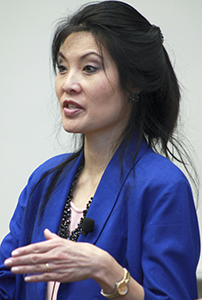International journalists call students to action against women’s oppression
Speaking at Kent State on Thursday, Nicholas Kristof and Sheryl WuDunn, Pulitzer Prize-winning journalists and human rights activists called students to action against what President Lester Lefton called “the most compelling human-rights issues of our time,” women’s rights.
As featured guests at the fourth Presidential Speaker Series, Kristof and WuDunn discussed their book, “Half the Sky: Turning Oppression into Opportunity for Women Worldwide.”
Discussing topics ranging from human trafficking, sex slavery, violence against women and maternal mortality, “Half the Sky” brings to light global issues of women’s rights related to inequality.
“In an equitable world, there would be more females,” Kristof said. “But this is not an equitable world and discrimination on the basis of gender is not just about unequal pay, it’s not about inappropriate remarks or touching — it’s lethal.”
Kristof said he estimates between 50 and 120 million females are “missing” around the world. In terms of demographics, Kristof said, females are underrepresented and unaccounted for because they often do not have voice or are viewed as property.
“In any 10-year period, more girls are discriminated against to death in that sense than all the people who died in all the genocides of the 20th century,” Kristof said. “That’s a staggering figure.”
However, Kristof said there are potential solutions to the problems.
“Putting aside all the injustice,” Kristof said, “if you simply look at where you get the most leverage to bring about change on issues that we tend to care about, worldwide and domestically. It comes down to this: educate girls.
He continued saying women must work to help one another.
“To put it another way,” Kristof said, “women and girls aren’t the problem but the solution.”
WuDunn, Kristof’s wife, works as an investment banker helping to find solutions to women’s economic issues around the world.
“There are real solutions (to the challenges of women’s inequality), and they break down into two categories: education and jobs,” WuDunn said.
Through microloans and education, women can often elevate themselves out of poverty and into the workforce and educational system, WuDunn said.
“Micro-financing can be extremely, extremely powerful,” WuDunn said. “Things don’t always work very easily, so you have to continuously improve. But it also takes more than a village to bring about change. It takes a movement; it takes lots of people working together, doing a little bit, to bring about change.”
Mahtab Tehrani, graduate biology major and international student, said even though she had never read “Half the Sky,” she recognized the importance of discussing the oppression of women.
“These are real-life problems,” Tehrani said, “and you don’t hear about them in everyday news or TV that often…. It’s important to become aware, become engaged and get involved.”
Other students expressed the need in America for students to become aware of women’s rights issues both in American and around the world.
“I think that, in general, we don’t think about these issues,” said Erin Lawson. “As an undergrad, I had no idea that (the situation of women’s oppression) was anything like that.”
Some students who attended the event expressed a more personal relationship to the issues that were discussed.
“We should feel a connection with people,” said political science graduate student Kristen Traynor. “To me, when I read the book and watch the documentary, I feel for these women and feel that I want to help them with the problems they are going through. If I were in that situation, I would want someone to help me.”
WuDunn said students can get involved and help to provide solution. Overcoming the selfish desire instilled in our society by privilege, she said, is the real challenge.
“So what’s in it for you? Why should you care?” WuDunn asked. “There are very few things in life that can change your set point in life once you have all the material needs taken care of, which we all have. There are things that actually elevate your level of happiness, and one of those things is contributing to a cause larger than yourself.”
Contact Matthew Merchant at [email protected].



